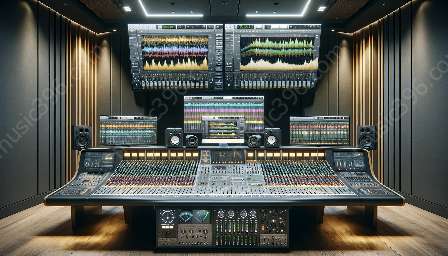When it comes to music and audio production, software plugins play a crucial role in shaping the sonic identity of recordings. These innovative tools have revolutionized the way in which music is created and produced, offering a wealth of creative possibilities for musicians, producers, and audio engineers.
From emulating classic analog gear to creating futuristic soundscapes, software plugins have become an essential part of the modern music production process. In this topic cluster, we'll delve into the fascinating world of software plugins, exploring their impact on music and audio recordings, and the techniques used to harness their full potential.
The Evolution of Software Plugins in Music Production
The use of software plugins in music production has evolved significantly over the years. What was once limited to basic effects and virtual instruments has now expanded to include sophisticated processing tools that can emulate the behavior of analog hardware with remarkable accuracy. Producers and engineers now have access to a vast array of plugins that can shape the tone, dynamics, and spatial characteristics of audio recordings.
One of the key advantages of software plugins is their versatility and flexibility. Unlike traditional hardware units, plugins can be easily updated, customized, and incorporated into various digital audio workstations (DAWs), allowing for seamless integration with existing production workflows.
Understanding the Sonic Identity
The sonic identity of a piece of music or an audio recording is defined by its unique sonic characteristics, which can include timbre, texture, spatiality, and dynamics. Software plugins play a pivotal role in shaping and enhancing these sonic attributes, empowering music creators to craft compelling and immersive soundscapes.
By using a combination of EQ, compression, reverb, delay, and other processing plugins, musicians and producers can sculpt the sonic characteristics of individual instruments, vocals, and overall mixes. These tools enable them to manipulate the frequency response, dynamic range, and spatial imaging of sound, resulting in a distinct sonic signature that resonates with listeners.
Emulating Analog Sounds
One of the remarkable capabilities of software plugins is their ability to emulate the distinct sonic characteristics of classic analog gear. Through sophisticated algorithms and meticulous modeling techniques, developers have created plugins that accurately replicate the warmth, saturation, and nonlinear behavior of vintage hardware units such as compressors, equalizers, and synthesizers.
For music producers and audio engineers, this means having access to a vast palette of sonic flavors that were once confined to physical studio setups. Whether it's capturing the rich harmonics of a tube compressor or the organic resonance of a tape echo machine, software plugins have made it possible to infuse modern recordings with the timeless sonic qualities of analog equipment.
Fostering Creativity and Experimentation
Software plugins not only offer faithful emulations of hardware gear but also push the boundaries of sonic exploration. With innovative synthesis engines, convolution reverbs, and spectral processing tools, musicians and sound designers can embark on sonic adventures that were previously unattainable.
By harnessing the creative potential of software plugins, artists can paint sonic landscapes that defy conventional norms, infusing their music with avant-garde textures and atmospheres. The ability to manipulate audio in unconventional ways paves the path for experimentation and innovation, ultimately shaping the sonic identity of music and audio recordings in unprecedented ways.
Optimizing the Mix and Mastering Process
When it comes to mixing and mastering, software plugins are indispensable tools for achieving professional-grade results. From precision EQs and transparent compressors to comprehensive mastering suites, these plugins empower engineers to fine-tune every aspect of a mix with precision and accuracy.
Furthermore, advancements in algorithmic processing and artificial intelligence have led to the development of intelligent plugins that can analyze audio content and provide automated suggestions for enhancing clarity, balance, and coherence in a mix or master. This level of technical sophistication enables producers and engineers to achieve polished, radio-ready soundscapes with efficiency and consistency.
The Future of Sonic Identity
As technology continues to evolve, the future of sonic identity in music and audio production holds boundless possibilities. With advancements in machine learning, spatial audio, and interactive sound design, software plugins are poised to play a central role in shaping the next generation of sonic experiences.
Whether it's creating immersive audio for virtual reality environments, personalized spatial mixes for streaming platforms, or AI-driven sound design tools, the trajectory of software plugins in music and audio production points towards an era of unprecedented sonic creativity and expression.




























